'Trust me, I don't even enjoy the company of friends who live in regret.'
'You either own your decisions or just let it go and work harder to get something better.'

"It's a new year and new anti-bodies," Mrunal Thakur announces, having recovered from COVID-19 recently.
"My family lives with me, so I gave it to my sister. How could I not?" she adds with a laugh.
Mrunal has been having a wonderful run as an actress, and she expects it to get even better with her next film, Jersey.
She tells Ronjita Kulkarni/Rediff.com, "I have always been the sweet, supportive girl, but here (in Jersey), I am not. People will get to see a different version of me as an actor."
Jersey was supposed to release on December 31, but got postponed because of the pandemic. Were you disappointed?
Of course, I was! But everything has its time.
The film is destined to release when times are good, when it is safe for people to travel to the theatres.
I feel like the wait is going to be worth it.
It's a beautiful film, and people will enjoy it on the big screen.
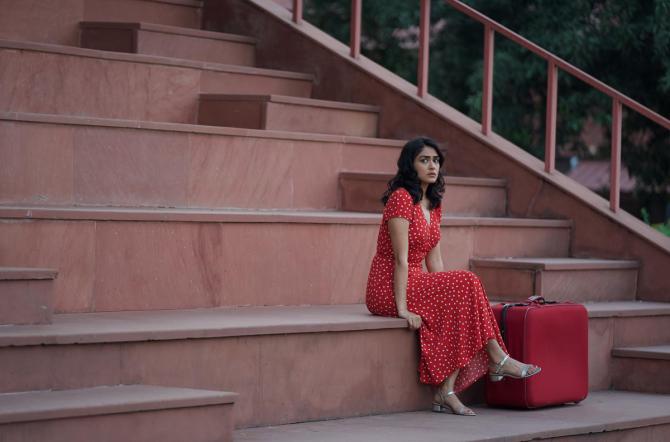
How important is Jersey for your career?
It's very important for my career because for the first time, I'm playing a character that I have not done before.
I have always been the sweet, supportive girl, but here, I am not.
People will get to see a different version of me as an actor.
I think when the film releases, film-makers will trust me because there are few roles where an actor gets an opportunity to showcase their talent.
I think this is going to be a game-changer for me in my career.
What was it like working with Shahid Kapoor?
It was a brilliant experience!
Every day was a learning experience.
He is a fabulous actor and a great human being.
It's really nice to have co-actors that are supportive, who I am confident with on set while performing.
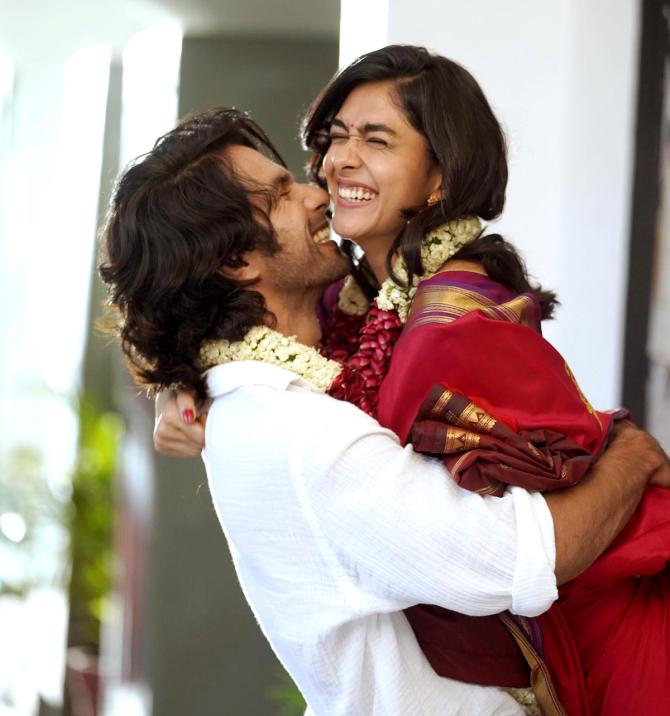
His father Pankaj Kapur stars in Jersey too.
Oh, my God, whenever I did scenes with Pankaj sir, I was very attentive and alert!
I would observe the way he worked, and the way he would surrender to the director. That's what I learnt from him. His takes were absolutely different. One take would be completely different from the other.
He can do one take in 10 different ways.
Every time he says a dialogue, it feels like it is a part of a conversation.
How do you make sure like your character feels different in every movie?
I make sure it's relatable.
What happens is, when you watch or film or a Web series, the reason why you like that particular character is because you're relating with that person.
Somewhere down the line, you compare those incidences and feel that arrey haan yaar, mere saath bhi aisa hua tha. So I think the key is, is it relatable?
If I'm not relating it with the character, I don't think my audience will be able to relate with it.
With every character that I play, I draw inspiration from various people.
Like in Jersey, I took inspiration from my mother. And small, small, things make such a huge difference.
Like, for example, I had a scene with my child (in the film). It becomes very mechanical if I say a dialogue and then the kid says his. Meanwhile, it would be so nice if I have an activity, for example, I'm sharpening his pencils.
My mother would always sharpen my pencils and never give us the sharpner because hum choti kar dete the pencils.
So this is a very small thing that I have added in the scene.
The other activity my mother always did was before leaving the house, she would always make sure that I said a prayer, no matter how late I was.
So these small, small things make the scene more endearing.
You know how a mother gets hurt when the child doesn't eat the tiffin that she packed for him?
A mother will be able to relate with it that oh, this is exactly what I do.
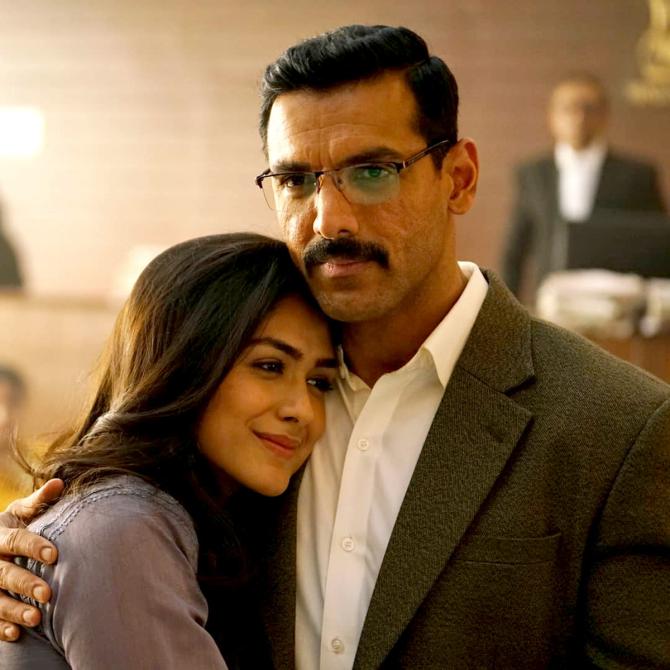
Super 30, Toofan, Batla House, Dhamaka, Jersey: Which of these women is closest to you?
Sorry to give such a diplomatic answer, but they all are a part of me.
I started with Bulbul (in the television show Kumkum Bhagya), which was about discovering myself. She is somebody who allowed me to discover myself.
When it comes to Super 30, it was a daughter, who lived up to her father's expectations.
Nandita, the character I played in Batla House, is somebody who's true to the profession that she is in.
The same goes for Nandita in Dhamaka.
When it comes to Toofan, she is someone who is passionate about her work but hopelessly romantic and somebody who believes in humanity.
In Jersey, Vidya is very close to me because she's a practical woman.
So all these characters are extremely close to me. If not, I wouldn't have played them.
Trust me, playing a character se zyada difficult is choosing a script. That is the most difficult part of my career.
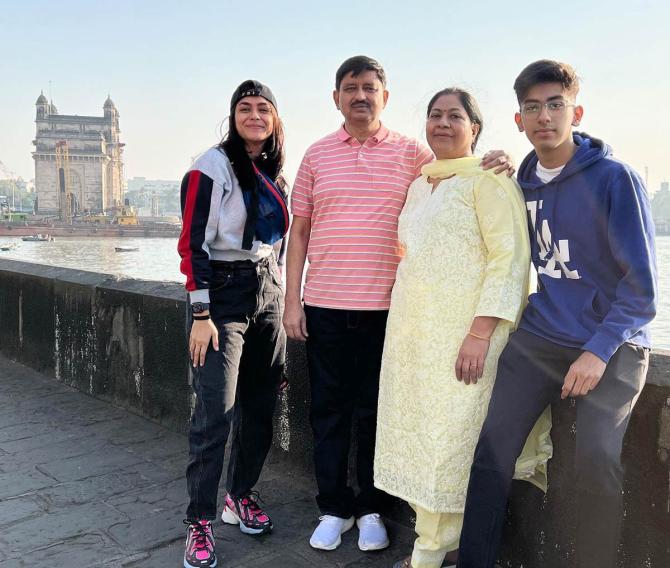
Do your parents help you in making that decision?
Yes. There is a long process and I take a lot of time to decide about the script.
I ask my parents what they think.
I also discuss it with my team.
Eventually, the decision is mine.
Whatever the gut instinct says, I do that.
I don't get influenced by people, like let's do this because the formula is working.
There was a time where the only biopics were being made but I don't want to follow that formula. I want to do something extraordinary.
Trust me, it's a very difficult process. I am struggling every day.
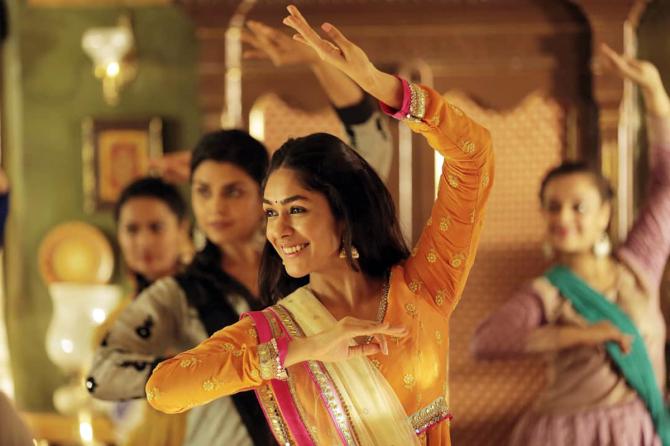
Do you have any regrets?
No, I have never had any regrets, not just about the work that I do, but in life generally.
I think I was raised as a person who's very decisive, with a clear mind and thought process. If it's a yes, it's a yes. If it's a no, there's no looking back.
There's no point of living life in regret, yaar.
Trust me, I don't even enjoy the company of friends who live in regret.
You either own your decisions or just let it go and work harder to get something better.
Did you always want to be an actress?
Since college, yes.
I did not know what I wanted to do until the age of 16.
All I knew was that I was extremely comfortable in front of the camera.
I wanted to be a dentist because my family wanted that. That was one of the dreams I grew up with.
But then I auditioned for a show and that's how it happened.
I knew since childhood that I wanted to feature in front of the camera. That's why I started pursuing a degree in BMM (Bachelors in Mass Media).
I thought if I'm a crime journalist, I'll start reporting news live and at least that way, feature on television. That's how it started, actually.
From journalism, to auditioning for television to films, and here I am, doing this interview with you.
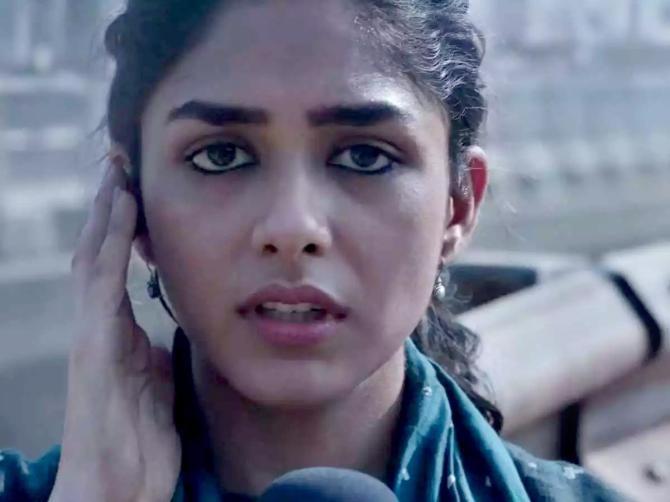
And you played a journalist in Dhamaka.
You know, that's why I think I played a journalist because woh kwawish thi bachpan se, to be someone on the field and report news.
My dad's friend's son is a reporter and he covered the 26/11 attacks. I was really inspired by him.
It takes a lot of courage to be there doing your work when people are scared. You know, you're in a crisis but still doing your job.
I really appreciate that quality and I have always felt like I am strong enough to play... woh kehte na dhaadas hai... I don't know where I get that strength from, but I always have had this curiosity of doing something extraordinary, which requires a lot of courage and strength.
From a television actor to films, how tough was that transition?
Every transition is difficult.
Like, I was talking to my mother on her birthday, and she said, you've come a long way.
Now, when I look back, I wonder kaise kar liya yaar maine?
Sometimes I get surprised by the kind of hard work I've been through.
It was a lovely phase, and I own it.
I get really proud when I speak about my journey.
I take immense pride in starting with TV.
Earlier, it was looked down upon but right now, looking at OTT platforms, and the opportunities available, it doesn't matter that you are from TV or from theatre. Like, Amruta Subhash in Dhamaka comes from a theatre background, and she absolutely nailed the role!
Now, what matters is film-makers cast actors who are good performers.

What was the toughest challenge?
Every time I wanted to do a film, and the film would not happen, I would end up doing a television show.
But a show does not last for one or two months. A show goes on for years and years and years, and you are committed to it.
I was not even allowed to audition for something because 30 days of my month were blocked!
I barely had any days for myself.
So I missed out on age.
Like actresses nowadays start their Bollywood careers at the age of 20-21.
I started at the age of 25.
My Bollywood debut Super 30 released when I was 27!
So yes, it took a lot of time.
TV takes up all your time.
Also, people would not really entertain me during auditions. They would say go home, this is this is for films, not TV, because at that time, they would look at it as a stereotype ki television actors can't do films.
So even to get an audition was like a struggle ki sir, le lo, dekhte hai ki film-maker ko pasand aaya ya nahin.
Thirdly, the wait. After getting a film and waiting for it to release, it took two-and-a-half years. So patience... jaan le li us waqt! (Laughs
Love Sonia took a lot of time, Super 30 also took time to release, and now Jersey is taking time to release...
It's really tough to wait for something you're extremely proud of, to release.
When it doesn't come out, it takes a toll on your mental health.
But this process has taught me to be patient.
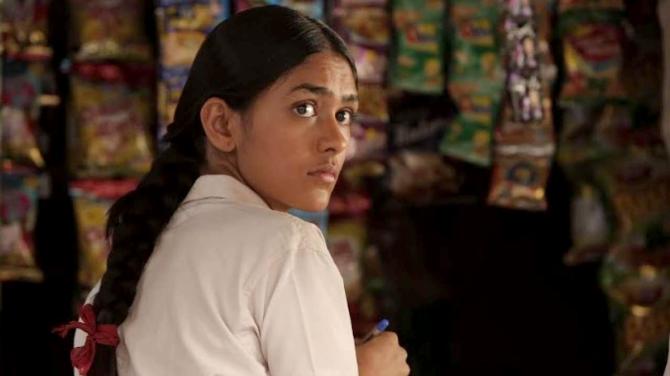
Your first film Love Sonia didn't do well. Were you disappointed?
The best thing that happened about Love Sonia that a couple of film-makers and my friends started an NGO and we saved some 17-18 girls through this process. That was my biggest achievement.
India was not ready for a film like Love Sonia in 2018.
Had it released on Netflix or any other platform in 2021 or 2022, people would have appreciated it.
But the thing that kept me going was the fact it did extremely well at international film festivals. Attending these film festivals was a different experience altogether.
Also, at that point of time, there were no eyeballs. If I had done Love Sonia after a film like say Jersey, the film would have got better recognition.
But that's not in my hands.
I really wish that at least now, through your interview, people will watch the work I've done in the past.
I don't do work just to flaunt that I am a Bollywood actress. I choose roles in order to have some kind of impact on society.
We need to contribute to society, and this is my way of doing it -- making people aware about things that are happening in the country, in the world.
It's a serious issue that we need to talk about.
I really hope that this film gets recognition, not because I would get popular and stuff like that, but also so that new film-makers, who want to make movies for the sake of art and for the sake of awareness, would dare to make something like that.
Right now, what happens is scripts get altered at a very initial stage, ki bhikegi hi nahin. That's why a formula gets applied, and people only end up doing movies, which they know will work.
So I really wish that new film-makers and actors take risks and do movies, which will not just educate our people, but would also make them aware of the situations that we are in.
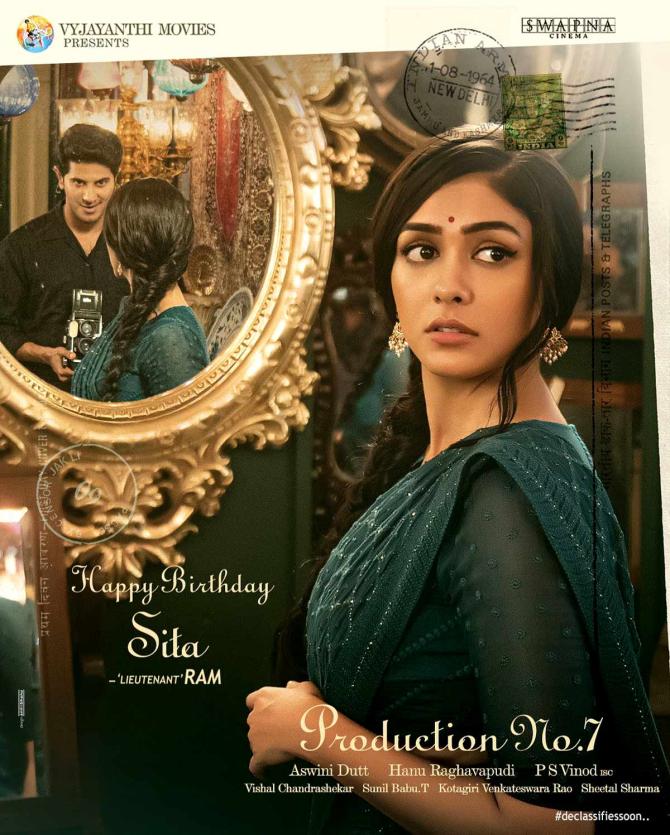
What films will we see you in next?
Currently, I am working on this Telugu movie with Dulquer Salmaan, and we are almost done.
I got COVID, so we had to stop the shoot. But we are on the last leg of the film.
What is Dulquer like?
Dulquer is absolutely adorable. He's very sweet.
Jitni Telugu mere liya alien hai utni unke bhi hai because he speaks Malayalam and I speak Hindi/Marathi.
But it was interesting to see the kind of hard work he's takes on for a role that he's playing.
He's extremely down-to-earth, which I really did not expect.
Tell us about yourself.
I was born in Nashik.
I have changed 11 schools because my dad is a government employee, so I have been all over Maharashtra and Kerala.
I came to Bombay when I was in Standard 8.
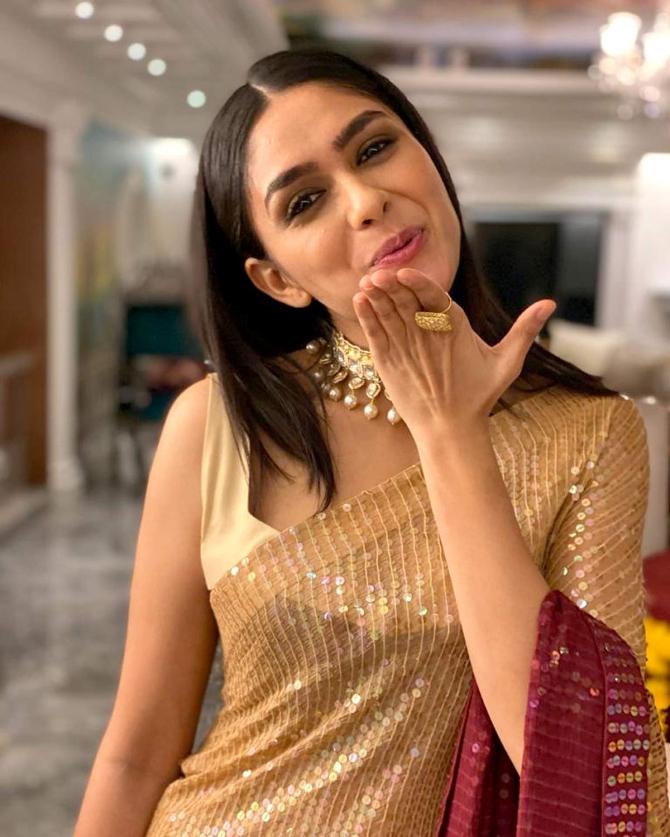
What is the one lesson that you have learnt in Bollywood?
That success is temporary.
You need to keep working harder, no matter what success or failure you see.
Also, be humble. That takes you a long way.
You met David Beckham recently. Are you a fan?
You know, I got hooked on to Formula One because of a school friend of mine.
I love driving, but I was never so passionate about racing and F1 before.
When I got to know that a F1 race is happening in Doha, I felt I had to be there!
I support Lewis Hamilton.
While I was there, David Beckham also happened to be there. It was like a dream come true to see him, to talk to him and to be able to click a picture with him!
I had my fan moment with him.
All my girlfriends were so jealous that I got a chance to meet him!
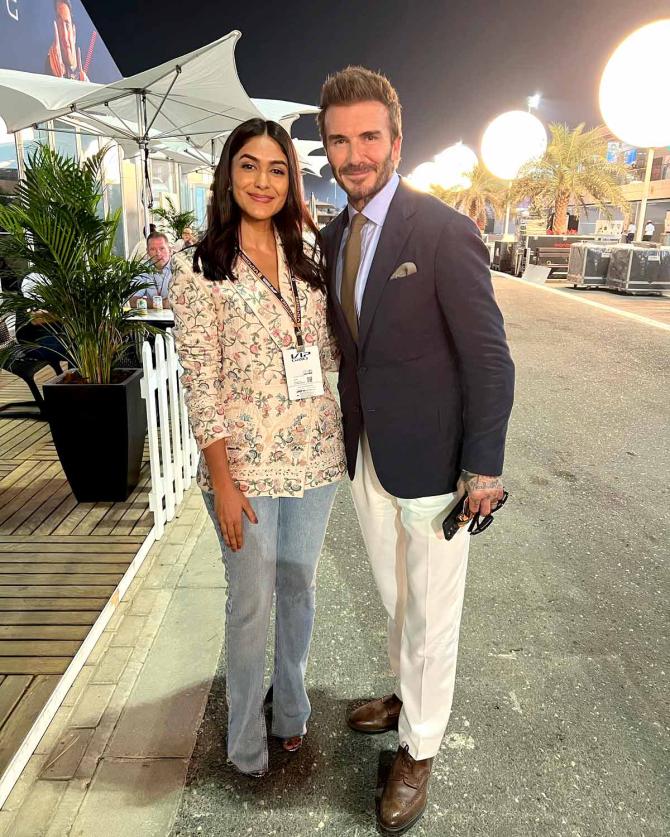
What car do you drive?
I drive a Fortuner. I'm an SUV person.
Driving is like therapy to me.
When I recovered from COVID, the first thing I did was go on a long drive.
I just put on my music and drove! That's how I celebrated.
You are the face of Nair hair removal brand. It must have come in handy when you could not go to a parlour in the lockdown.
It saved me during the lockdown.
I really wish it was there when I was growing up.
It's something you really need. You don't have to schedule an appointment (in a beauty parlour), you can do it yourself.
It allows you to live freely and be independent.
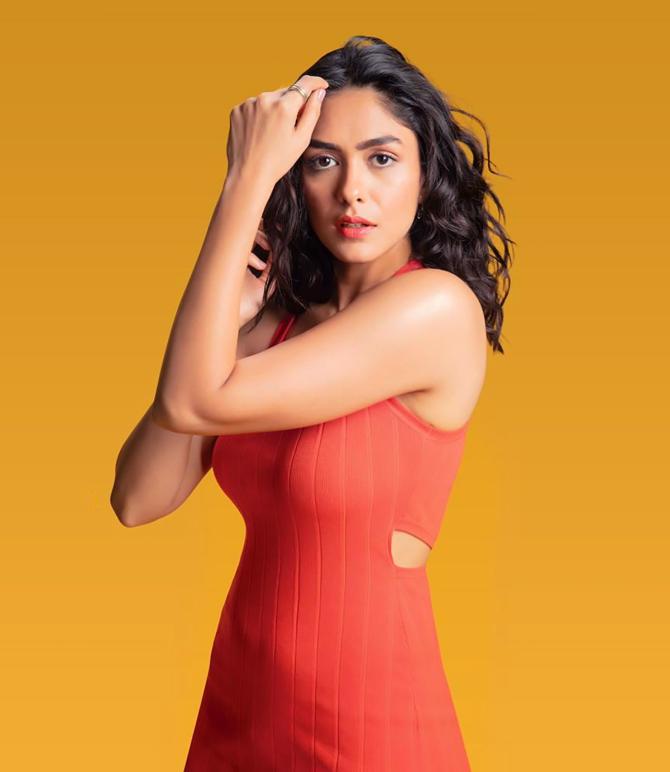
How do you make sure to live on your own terms?
I don't want to seek permission from anyone. Even now, there are girls who need to seek permission from their mothers or mothers-in-law to cut their hair. But it's your hair!
I don't want to seek permission from anyone when it comes to my life.
I want to be decisive, be independent and live my life freely.
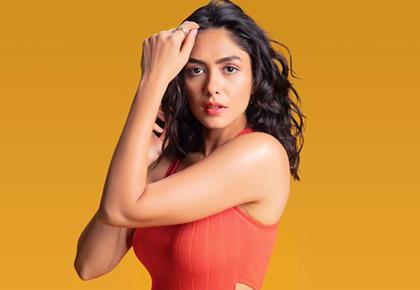











 © 2025
© 2025